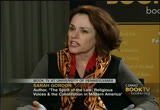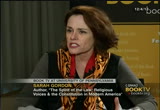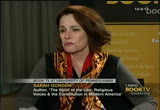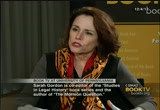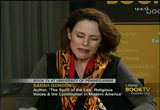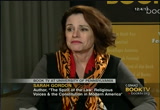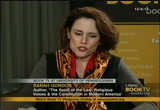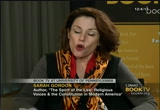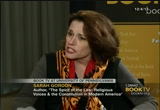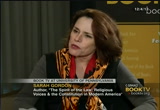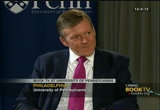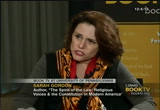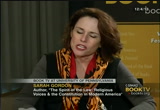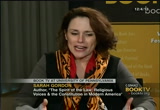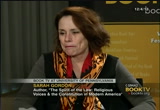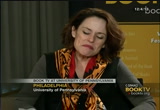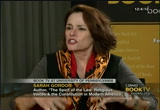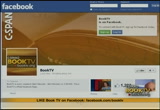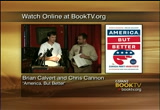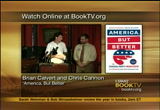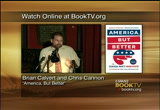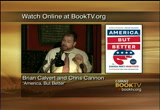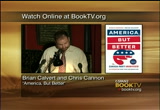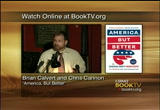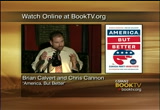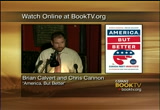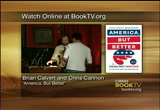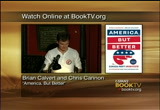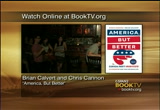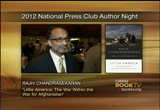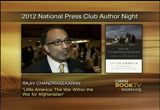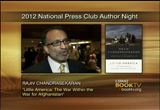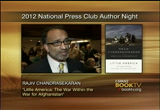tv Book TV CSPAN December 17, 2012 1:25am-2:00am EST
1:25 am
the rights of religious organizations, and so on, and in the early decades of the 20th century, that began to shift as the supreme court applieded the national constitutional establishment and free exercise clauses of the first amendment against the states or centralizing debates about religion. >> host: but if the states had the control, it's written into the constitution, freedom of religion. >> guest: we did, indeed, but the first amendment begins congress shall enact no law. it was addressed only to the national government. >> host: were there restrictions by different states on religion? >> guest: oh, yes, there were. several states had religious establishments and most states limited the amount of property a religious organization could own, some taxed religious property. others banned given groups practices. for example, eventually, various
1:26 am
states in the southwest banning polygamy, for example. >> host: so when it came to massachusetts, talk about massachusetts or pennsylvania, we're here in pennsylvania, as a case study of states, regulating religion. >> guest: sure. pennsylvania, for example, had an active blasphemy now, which we think of now as unconstitutional, but in the last case that was brought, the last criminal prosecution under blasphemy law was actually brought in the early 1970s, kind of by accident, against someone who had a sign in the window saying something like "wanted: radical carpenter, speaks to crowd preaching peace," and, of course, the person met jesus, but someone complained, and the american civil liberties union
1:27 am
got involved, and the prosecution was droppedded. more recently, the -- a film company owner tried to name his company i choose hell productions, and was denied in corporation under the state's incorporation laws because it was a blasphemy title for the company, and that, too, eventually was dismissed. >> host: professor gordon, why did it start to change in the early 20th century in >> -- >> guest: i think for several reasons m one was especially the growth of the federal government in the new deal era. the other, really, was that the embrace of migration and pluralism, and immigration began to cease a little bit after the restrictive immigration acts of
1:28 am
the early 20th century, and then the new deal forced so many people on to the move. the -- looking for work, having much greater contact with government, and the expansion of government power really highlighted the friction between a bigger government and lives of believers. there was a lot more attention. >> host: you write about the salvation army and the spirit of the law. what's the role of the salvation army in changing religious laws in america, i guess? >> guest: well, the salvation army, which people don't realize, is an evangelical religious group, not just a group that rings bells outside department stores in the christmas season. the salvation army believed in what they called the cathedral of the open air and would go into areas, especially
1:29 am
impoverished areas, and have parades and make lots of noise with brass bands and cymbals, and loud preaching trying to attract, especially the urban poor, back into religious life. this came up against requirements of many cities that any parade be permitted, and the salvation army made it a practice not to apply for permits, and to be arrested, often playing instruments into the way into the cell, and challenges laws as anti-religious, and they won and lost a lot of them. they destabilized the law of the states by challenging these restrictions, and they never really made it to the supreme court of the united states, though, because the states were still in power. >> host: professor gordon, when did the first major religious case come before the supreme court? >> guest: cases from the
1:30 am
federal territories had come in the 19th century via, especially utah, questions of polygamy, but from the states, the really major cases made it to the supreme court in the late 1930s and early 1940s, really, that new deal era, and they tended not so much to be the salvation army, but the johova witnesses that caused trouble. >> host: what was one of the cases, walk us through. >> guest: an interesting case called cantwell against connecticut involved a group of witnesses that had gone into a catholic neighborhood in new haven on a sunday morning and began playing anti-catholic records on portable phonographs and distributing literature, and they were arrested for disturbing the peace and preaching without a permit, and
1:31 am
appealed their case all the way to the supreme court which said that because connecticut said, well, individual city administrators would decide what a valid program was for religious organizations and would allow them or not on to the streets, they said that allows too much discretion by the state government, and they applied for the first time part of that first amendment, this time, the free exercise clause, as against the state of connecticut, and overturned their law that allowed city officials to license or not as they saw fit. >> host: and did that lead to any nationwide movements, or was it a well publicized case at the time? >> guest: it was a relatively well publicizedded case at the time. the really big movements came when jehova's witnesses, again, required laws to have school children to salute the flag every morning to say the pledge
1:32 am
of allegiance, and at first they lost when they got to the supreme court, and in 1940 # they lost in a big case that got a lot of attention, and after that violence broke out against witnesses all across the country, and three years later, the supreme court changed its mind, and said, you know, we may be interested in patriotism and national unity, but not by beating up school children. >> host: and so today, are school chirp, because most classes begin with the pledge of allegiance -- >> guest: they do indeed. >> host: if a child wants to sit during that, can they legally? >> >> guest: they are constitutionally protected in their right not to say the pledge of allegiance, yes. >> host: the spirit of the law, tim and beverley lehay, who are they, and why did they occupy a good portion of your book? >> guest: they are less well
1:33 am
known than they should be. they were actually involved in very important religious movements from the 1960s through the very late 1990s. they were part of a resur -- resergeant evangelical culture, and they like other southern e january jell -- evangelicals migrated to california, set up megachurchs and constitutions, and eventually became deeply involved in politics. beverley, a particular interest of mine in this book, founded a group called concerned women for america, which still claims to be the largest women's political organization in the united states, and she based her organization on five spiritual principles, the bible, the family, patriotism, the sanctity of marriage, the sanctity of life, and she began to litigate arguing that religious parents should have more control.
1:34 am
for example, over what their children were taught in school, arguing that the era, the equal rights amendment for women, was a violation of the fundamental order of things, and winning many of these cases. >> host: did you interview her for the book? >> guest: i did not. she actually lives in seclusion now. she retired about, oh, almost 15 years ago now, and lives in california again. >> host: somebody you would have liked to talk to? >> guest: i would very much like to talk to her m one of the things that i think is really important is that an organization like hers, which was so involved, no foundational to conservative women's political activism, if prepares are not depositedded anywhere, they are not available to be read, other women who headed up
1:35 am
on much smaller organizations talks to everybody. really someone like beverley and concernedded women for america deserve substantially more attention and for posterity should deposit papers so we can learn from them. >> host: a professor of law and professor of history here at the university of pennsylvania. this is her most recent book, "the spirit of the law: religious voices and the constitution in modern america," harvard university press, and also the author of "the mormon question," and you referredded to polygamy a couple times in the short discussion here. was that the issue about the mormons, that really kind of got under people's skin? >> guest: it was the most prominent one. there were others, and in some ways, if you think, say,
1:36 am
questions of access to public places for religion speech and life as a key to the 20th century, in the 19th century, the really big question was would mormons be allowed to redefine marriage for themselves and control the legal system enough so that polygamy would be recognized and protected as a valid form of marriage by the secular legal system, not just by the church, itself. >> host: so are there parallels to the gay marriage debate of today? >> guest: substantial parallels. one of the key issues for mormon apologists as well as for their opponents was the question of state hood for utah. it became pretty clear early on
1:37 am
in american history that states had substantial control over marriage within their borders. as we're seeing being fought out in the marriage equality debates today, and utah pushed again and again for statehood and was denied again and again in large part because of the question of polygamy. the federal government had much more control over territorial governments than it does, did or does, over state governments, so, yes, there's a big issue about how much control states have over marriage, was polygamy foundational inlessenning that control? at the time, the debate was no, it wasn't. it was about keeping utah out of statehood, and unless there's a transformative supreme court opinion, which may happen,
1:38 am
coming especially from the california cases, it is still within state control. >> host: sarah gordon, you have a forthcoming book called "the place of faith," and where did you get interested in the subject of law and religion? >> guest: well, i became deeply interested when i was thinking about applying to graduate school, and i was torn. did i want to go to seminary or to law school? for family reasons, my husband wanted to relocate to connecticut. i wound up in law school rather than in seminary and was delighted when i discovered i could do a joint degree with the divinity school at yale, and thought i had been trading off one interest against the other and discovered, thanks to the availability of interdisciplinary training, that i could actually combine my interests so i started in around
1:39 am
1982. i'm in my 30th year of working in this field and i find myself still fascinated, still intrigued, and dedicated to thinking deeply about the relationship between law and religion. >> host: where was the picture from on the cover of "the spirit of the law"? >> guest: oh, this is outside the united states supreme court, and it was taken on the day that a challenge to the pledge of allegiance, not the requirement that students say it, but the insertion of the words "under god" into the pledge of allege, which happened actually in the 1950s in part of the cold war pushback against communism atheism, and this is a person
1:40 am
praying for the protection of public acknowledgement of god outside the supreme court on the day the case was argued, and behind her, you see two guards standing, looking far less dramatic than she does. i don't know if you can see, but she's weeping as she prays, and it's a very dynamic picture. i was thrilled to see it on the cover. >> host: professor gordon, some of the cases that we hear about today include nativity scenes, ten commandments. is there a national standard yet on the nativity scenes and ten commandments and where they can be displayed? >> guest: there's many national standards, and i think sometimes they disagree with each other. the basic rule seems to be that if it's just a or just the ten
1:41 am
commandments, that violates the clause. if a nativity scene or the ten commandments or a menora combined with other things illustrating not just religious commitments, but broad commitments of the american people, then they have a far better chance of surviving, and the other thing that does seem to happen is if they've been there for a long time, if they are part of historic architecture or in a museum, for example, exhibited for the beauty of the art as well as the message, then that's also probably okay. >> host: what, if any, supreme court cases do you see, do you foresee coming? >> guest: oh, that's a tough question. historians are reluctant to predict. one of the things we see happening across the country is
1:42 am
schism, especially in major protestant, presbyterian, and on down the line are fighting with each other about the sanctity of same-sex relationships. further back, but still bitter about the order nation of women, and we see litigation in every state, and differing standards applied by differing states as to whether a seceding group can take its property with it or not. we have opinions from south carolina, california, virginia, massachusetts, connecticut, i could go down the line, and these are very high ticket items, churches, a lot of real
1:43 am
estate involved worth many tens of millions of dollars each. the ep church sending millions of dollars a year on lawyer's fees, and these are difficult questions affecting very long standing denominations across america. these are tough questions. >> host: sarah gordon, professor of constitutional law and history at the university of pennsylvania in philadelphia, and the author of most recently of this book "the spirit of the law: religious voices and the constitution in modern america." >> guest: thank you so much.
1:44 am
>> my name is chris cannon and brian talbert, foundsers of the party, and we wrote a damn book. we are here to tell you about it, why we're here, all the way from vancouver, and brian is going to give us his stump speech. i have 5 quick chapter, and a q&a, and after that, you can make noise and buy beers, all right? [laughter] we're from vancouver. about a year ago, we wanted to get into political humor. we did comedy, journalism, all kinds of stuff, but we have televisions in canada, so we were catching the breeze from what was coming up from down here watching the conventions, and for the past two years, everyone announcing their candidacy for the president of the united states, and 10 -- so we've seen your candidates, and, frankly, they scare the shit out of us, so we thought
1:45 am
canada would be a great candidate for president so we are running canada to be the president of the united states. not brian, not the canadian government, but the people because we love america, we love our big brother, we want to help. we're here to help, all right? we did a campaign video in january, went viral, about a half million views in the first two weeks, thrilled with that, got a lot of media, cnn, bbc, a lot of acronyms, and so we took off, did another couple videos, build a steady stream of followers, liked our message, and thins we had to say, and three weeks later, there was a book deal, and this is what we wrote "america, but better." i'll turn it over to brian, he's the beautiful face of canada representing 33 million of your close friends, brothers, and sisters up in the north who want to see you return to the great
1:46 am
country that you used to be and will be in the future. all right, thank you. [applause] >> thank you, chris. canna -- canada! canada! [laughter] i can't even get that going in canada, that's amazing. [laughter] it was 200 years ago when a addless sent american came north to pick a fight. naturally, canada apologized for being invaded, and we've been partners and bff's for years. you were the quarterback, strong, muscular, ruggedly good looking. [laughter] you were the country everybody aspired to be, but lately, you've stopped playing with the team. you put on a few pounds, hassling women, and beating up the gays. you became the bully that other countries fear, but don't respect. actually, canada, a few years your junior got dragged down
1:47 am
with you. now 200 years later, this paper thin border of ours does little to muffle the sound of your political anguish and we are doing what we can. we want you, america, to elect us your next president. [laughter] now it's not like we don't have our own faults. we are not perfect. our prim minister makes dick cheney look like a human rights crusader. we got a special thanks credit in the book of revelations which is why once we become president, we'll turn around and invade ourselves. a little regime change we call our own. now, you're probably asking yourself why would these guys be qualified? is canada qualified? not only is it cooler in canada, the con cements of freedom, but because we're america, jr., the little brother who is io dallize --
1:48 am
idolized you, grown up together, conquered a frontier together, laughed, cried, bled, overeaten at thanksgiving, and together, we created the weakest beers in the known universe. [laughter] now, what we really want is just to offer america a chance to kick back for awhile, you know, let us cook your meals, fluff your pillows, and give you team to heal and reevaluate your place in the universe. understand, america, we still love you. you're family. this is not an invasion. it's an intervention. now, we are aware that american laws state that all of your candidates have to be u.s. born, but since in canada we respect the right to same continent partners, beare legally obligated to consider ourselves by proxy so here we are. we published this manifesto --
1:49 am
[laughter] >> we only have one! [laughter] >> one to the highest bidder of people. we published this basically to present americans with our idea for america, which is the same america, just better. now, once elected, we'll tackle the big issues in the country. for example, sex education in schools will require to acknowledge there's such a thing as sex. [laughter] absz nans sex scandals play themselves out in movies. to america's waistline, we require fast food mascots be tied to the product they sell. we are excited to unvail the influence that will be big with the kids. regarding traditional marriage. one gay couple should be allowed to marry for each straight couple that gets divorced. congratulations, las vegas, you're about to be the gayest
1:50 am
city in america. to bring transparency back to the political process, like drugs and cigarettes, each new piece of legislation must clearly state possible side effects and must be titled to reflect its actual contents, thus, the patriot act is named, fuck you, thomas jefferson. [laughter] this enlightens the elitists and how to hate people who are better than you, and the metric season, exactly ten times more awesome than imperial units. we peeled back the layers of america in american exceptionalism or how to make other countries feel bad about their bodies. we present solutions and how to relieve america's sexual tension, crime and punishment, and then crime again. we even created a simple multiple choice questionnaire, helping american children determine their value as future americans. to reinvigorate the youth vote, many of which are right here, we
1:51 am
invented a drinking game. now, i know most of you are saying right now, or at least thinking to yourself, fuck you, you communism hockey lover. [laughter] i should tell you we're running this open, transparency of our own, and that's not nearly as offensive to canadians as you think. [laughter] i assure you we only want to raise america up, not tear it down, okay? we believe you deserve an honest president so, yes, america, you look fat in those pants. now, you need jobs. jobs is a big issue in the election. we're going to change the phrase "job creators," and job creationists," and give them seven days to create them. we'll close guantanamo bay and move prisoners to the arctic where they can be legally snow
1:52 am
boarded. cooperations on our watch, corporations will be people, but if they can't provide a birth certificate, they will be legally obligated to care for your lawn. we will not imprison you for smoking the green. we want to legalize it, tax it, invest in stock, and use that money to buy back american from china. america, it's probably very clear to you right now your shortest path to true democracy is due north. when you go into that polling station this year, don't just check the box for most charming millionaire. consider a country you truly deserve, canada, and together, we can make a new america, but better. thank you. [applause] >> thank you. [applause] >> thank you. >> awesome. >> handsome man. he's the average canadian.
1:53 am
they did a computer photo thing and averaged all the canadians together, and this is the guy we got. >> there's hairy women in canada. >> i'll read a standard mortality table -- short section, section 3.2. this is about the citizens united decision. do i have to explain that to anybody? okay, good. stop putting politicians on layaway, and start buying them out right at the bed, bath, and beyond integrity. a quick fact before i introduce the chapter. before i get going, thank you, c-span for coming out and covering this. you guys are awesome. [applause] more programming like this, a little less council on foreign relations and bull shit. [laughter] i'm going to read citizens divided, people are now corporations. before i get started, a quick fact, every chapter has a fact and campaign promise, and this fact is exxon and walmart are
1:54 am
now the largest people in the united states. the average american is catching up. [laughter] okay. citizens divided. people are now corporations. there has been much to do about the citizens united decision by the u.s. supreme court, poorly summarized by the chilling line you expect to find in a charleston hetton film, corporations are people. citizens united allows businesses to stop putting politicians on lay away at the congressmen outright store and purchase them outright at the bed, bath, and beyond integrity around the corner. they are turning businesses into people overnight is the 10% increase in the u.s. population, a citizenry reeling from high unemployment and increasingly scarce resource. who cares for the new humans? the small businesses now have a legal protection enjoyed by dwarves?
1:55 am
can they legally wed? who will they target from the nra? come on. at such challenges can want be met by the current infrastructure, we have no choice but to reduce the actual number of faith havers declaring a portion of them to be corporations and cooperation with the henderson family of albany, new york. nobody? last trip to new york. we have already begun a test program to help mrs. henderson transition economically unfeasible loving household into a streamlined model of genetic efficiency. this is a memo to the members of the henderson family from mom, subject: cut backs. glmplets watch this and other programs online at booktv.org. >> washington post correspondent and author, the newest book "little america, the war within the war for afghanistan."
1:56 am
mr. chandrasekaran, when you talk about the little war, what are you talking about? >> the communities built in southern afghanistan, not in the last couple years, but six decades ago back when unknown to most of the country mern, there were dozen of americans engineers there back in the 40s and 50s, digging canals, building dams, helping to nation build in afghanistan, and the very same terrain that president obama's troops surge unfolded in over the last couple years. in my history of obama's serge and examination of it, i actually start back in the 1940s in the remarkable period of american resistance to afghanistan, a period of great optimism when we built the town there that the afghans started to call little america, complete with a co-ed high school, a swimming pool where boys and girls swam together, a clubhouse to get a gin and tonic, and it was a period of great promise for the americans and afghans,
1:57 am
and i use that as the opening for this book that talks about the great hope and tragedy of our war in afghanistan today. >> does little america still exist? >> it does. it's the capital of helmand province. it looks nothing like it did way back then. the suburban homes now built over. there's no more swimming pool, and it's not quite as safe as a place as it was six decades ago unfortunately. >> now, for americans, six decades is a long time, but for the afghan community, it's not such a long period, is it? >> afghans over there still remember this period. i remember going up and traveling through hell mapped province in 2009, and an old afghan man asked me and the marine colonel i was with whether he knew mr. and mrs. learner. we were befuddled, but they were the couple that taught him
1:58 am
english back there decades ago, and he had no con september that the united states was a country of 300 million people. of course, we americans should know every other american, and why did we not know the people who taught him english? for the afghans of a certain generation, they remember with great fondness this period of american engagement, and, in fact, remember it far more fondly than they think of the current american period, the period of our stabilization activities there today unfortunately. >> now, rajiv, haven't there been several starts and stops and boom and busts, hopeful periods in our history with afghanistan? >> there has. you know, there's a 50s and 60s were a period of great optimism, the soviet invasion. after the taliban were toppled, after the 9/11 attacks, there was a period of great optimism that afghanistan could build a stable, democratic society, but we took our eye off the ball as
1:59 am
americans know. we focused on iraq, and what that allowed was the taliban to surge back in, and up fortunately, i think what we're seeing now is a period of a real mixed bag, if you will, there has been some real gains, paid for by the lives and limbs of many americans, many americans service members. we have beaten back the taliban in places, security has improvedded, but the real question is to whether any of that can be sustained, whether the afghan government, whether it's army and police force will be able to take the baton from the american forces as they start coming home over the next couple of years. >> imperial life in the emerald city was about baghdad, little america is about afghanistan. >> well, i think the challenge for us is we want to be on every device for every person at every hour of the day, and we're a mobile society, and so
110 Views
IN COLLECTIONS
CSPAN2 Television Archive
Television Archive  Television Archive News Search Service
Television Archive News Search Service 
Uploaded by TV Archive on

 Live Music Archive
Live Music Archive Librivox Free Audio
Librivox Free Audio Metropolitan Museum
Metropolitan Museum Cleveland Museum of Art
Cleveland Museum of Art Internet Arcade
Internet Arcade Console Living Room
Console Living Room Books to Borrow
Books to Borrow Open Library
Open Library TV News
TV News Understanding 9/11
Understanding 9/11